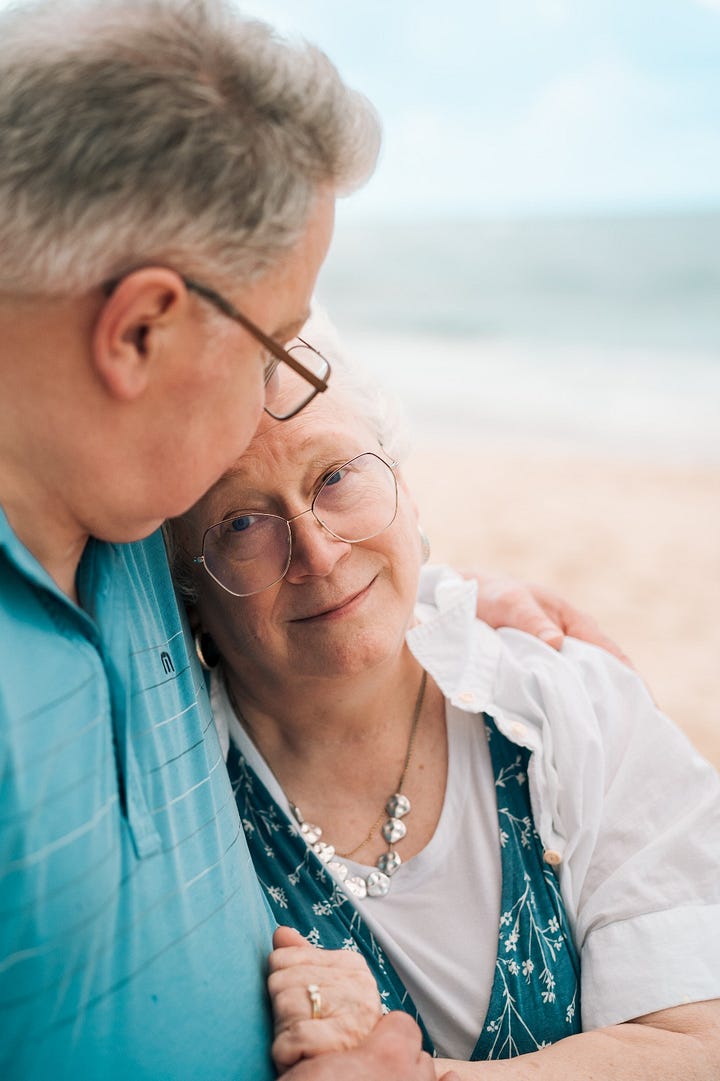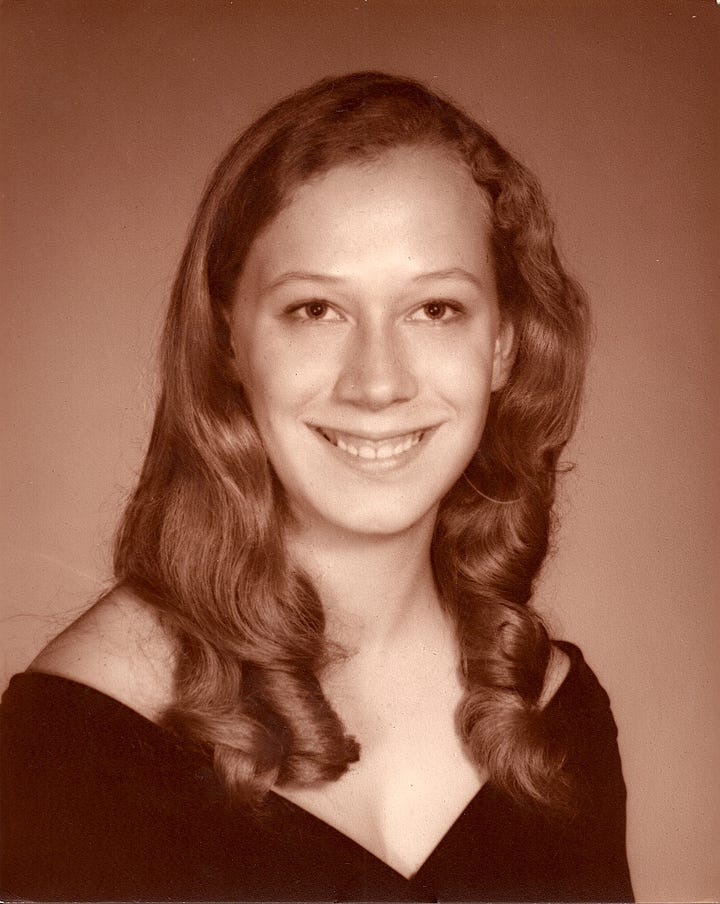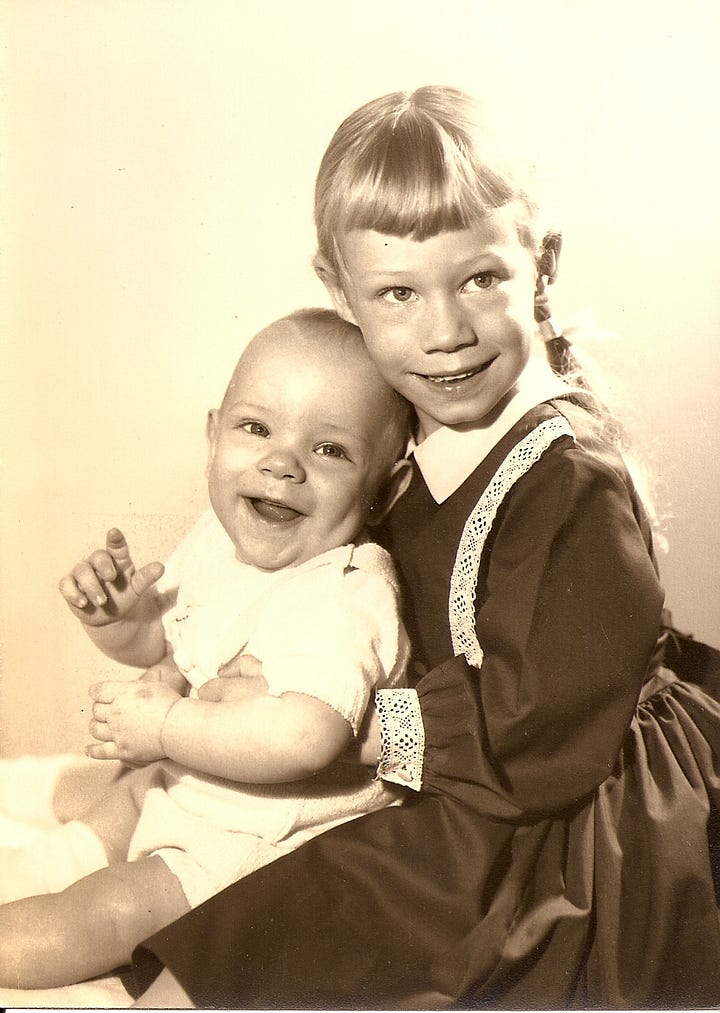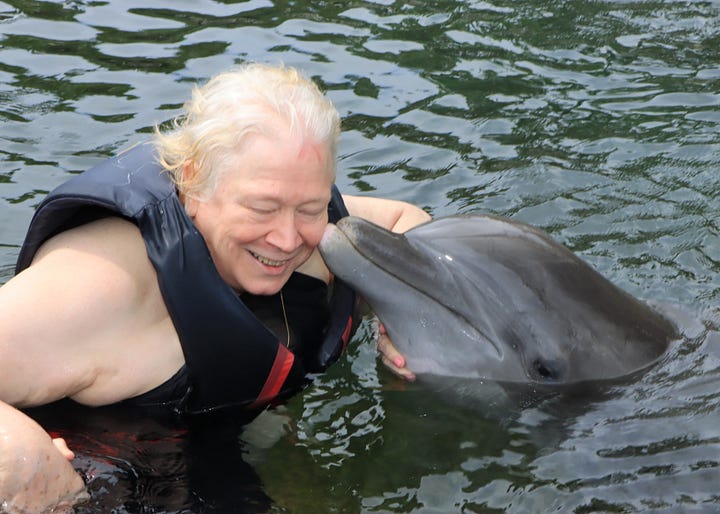



WHEREIN WE TURN THE CORNER: I have decided not to do a deep dive into my family history of woes. It does no good, and I have already dragged you through enough navel-gazing. So, I have decided to move on to a more lively part of the memoir. First I will talk about what happened next to permit my healing, and then I will continue with what happened next that consolidated my healing. This all happened within a space of a few years, from 1981-1983.
My parents helped me to return to Seattle. My previous employer gave me my job back (God bless her!) and I was able to rent a small walk-up furnished apartment with orange, black, and red geometric-patterned carpet and a turquoise couch. I had been trained by my mother with strict rules of color coordination. The decor hurt my eyes. But it was my own place. I could afford it.
I found a therapist with Catholic Community Services. There were years of therapy ahead. I needed to accept and deal with my past hurt in order to deal with my present pain. Feeling unloved and unlovable were the root of the problem. I can’t recount years of therapy here because it would be incredibly boring and too revealing at the same time. Self-pity, anger, grief, sorrow, loss, anger again,... eventually the pain eased.
I remember three distinct moments in my treatment. They will have to do as a summary of it. The first was a story my therapist told me.
“Imagine a teen-age boy approaching a basketball court where several other boys are playing. He asks if he can join them and they refuse, rather rudely. Now, there are two responses he can have. He can think, “What’s wrong with me?” or he can think “What’s wrong with them.”” A light went on within me.
The second was a meeting with a Catholic priest, at my therapist’s suggestion. After listening to my story, he said, “God does not make junk.” Another light went on.
The last was a moment walking down the street on a beautiful Seattle morning. The sun was shining in a deep blue sky and the temperature was perfect–warm but not hot. A light breeze played with my curly hair. I felt like singing. I suddenly realized I was happy. It was a feeling I had never felt before. It felt like I had been living in shades of gray and the world was now technicolor.
When I met with the priest it triggered something else. I had not found a church since the cult that I could trust. The problem was this: all of the Protestant churches I knew believed in sola scriptura, that the Bible was the sole authority for Christian belief. Ultimately, that meant that a person’s faith was based on his or her understanding of the Bible. However, the Bible is not always clear in its meaning, without proper context. It is a historical book made up of chapters from different times and places, describing the history of the Hebrews and the beginning of Christianity in letters, histories, stories, and poetry. It is not a volume of systematic theology. What the Bible teaches is subject to interpretation. What verses about baptism are definitive? For example.
The doctrine of sola scriptura says that no single accepted authority can speak on what the Bible actually teaches. That means if a man (or woman) is convinced that his (or her) church is wrong, then because he or she has a different interpretation of some doctrine that he or she considers essential, since his or her interpretation is the truth, he or she is justified in leaving and beginning a new church.
In the beginning, the Reformation was a response to the perceived abuses of the Catholic Church in matters of practice, like indulgences, but once the break with Rome occurred the Reformation then proceeded to dismantle matters of doctrine, doctrines truly essential in their interpretation: the validity of the priesthood, the nature of sacraments, the authority of the Church to interpret Scripture, and the meaning and requirements for salvation. Pretty fundamental stuff. Once Pandora’s box was opened, churches were born based on the interpretations and leadership of charismatic men and women. Luther, Calvin, Knox, Zwingli, Wesley, Mary Baker Eddy, Joseph Smith.
Unfortunately, this was what Elena and the housechurch had done. They started their own church because they differed in some interpretation of the Bible, probably the role of the charismatic gifts. Then Elena developed her own interpretation of Christianity, something not based on the Bible at all, but her interpretation, her inspiration, her charisma.
I was not going down that path again. I needed a Church with authority to interpret the Bible and matters of the Christian faith. That meant the Catholic Church.
For the love of God! I had been raised in a very anti-Catholic home, with all the black legend stuff about wicked popes, the Inquisition, and bad Catholics. My mother said Catholics were from the wrong side of the tracks, meaning they were poor immigrants who had to live in poor neighborhoods, but also implying they were somehow bad. Catholics were the worst kind of cult. I just left one cult and now I wanted to join another? I could hear my mother’s voice in my head.
The thing was, it didn’t jibe with my own experience of Catholics. They were some of the most sane, down-to-earth people I had met. First witness: my counselor, Second witness: the priest. Third witness: a book by Rumer Godden, a Catholic author. Something in it touched me, once again the solidity and sanity of the mother superior in the convent. So I began to look at the Catholic Church. It must have been God's grace.
.I spent a year reading. The Church had all I longed for: authority to preserve the Truth, and deep spirituality. I already believed in Catholic doctrines like purgatory, the indissolubility of marriage, and the primacy of the Papacy because of my study of Scripture. I also believed in the Real Presence of Christ in the Eucharist. I could receive Jesus in communion! I can't begin to express how much I longed for that.
The Church's spiritual riches are incredible. You could live as a Catholic through several lifetimes and still not plumb all the depths. Most of all, the Blessed Mother of Jesus is our Mother too.
Then there was the Church’s service of the poor. The tradition goes way back to the middle ages. For example, a very wealthy man named Fugger who was also a devout Catholic established a community where people who could not afford their rent could live at a significantly reduced rate. Named after its founder, it was called “die Fuggerei,” and it was one of the first examples of “social housing”in Europe. It has been in continuous operation since the sixteenth century.. There are many examples of service to the poor. Hospitals were first formed to help the poor. Workshops and schools were set up to help people to learn a trade. And of course there were many orphanages.
I became interested in serving the poor because verses I found in Isaiah 58.
Isaiah 58:6-12 gives a promise:
Is not this the fast that I choose:
to loose the bonds of injustice,
to undo the thongs of the yoke,
to let the oppressed go free,
and to break every yoke?
Is it not to share your bread with the hungry,
and bring the homeless poor into your house;
when you see the naked, to cover them,
and not to hide yourself from your own kin?
Then your light shall break forth like the dawn,
and your healing shall spring up quickly;
your vindicator shall go before you,
the glory of the Lord shall be your rear guard.
Then you shall call, and the Lord will answer;
you shall cry for help, and he will say, Here I am.
Boy, did I need healing to rise up speedily. So I looked around for a place where I could begin to work with the poor. Parishioners at Blessed Sacrament, a local Catholic Church, cooked a hot meal every Sunday for anyone and everyone who wanted to eat. It was run by several retired men who began the Sunday soup kitchen as a part of the St. Vincent de Paul Society. I met faithful Catholics, who clearly loved the Lord and served the poor, and they quickly adopted me as one of their own. Pat Campbell was a retired quartermaster from the Navy and had expertise in finding supplies. He would go out to glean food from grocery stores and wherever else he knew that would donate food.
Gordon Kirby would pick me up at 6 AM on Sunday so I could help chop vegetables for their famous stew. Another gentleman who had been a cook supervised the cooking of the stew made from whatever Pat had gleaned that week. Later I began to work the service line. I saw people of all sorts and for the most part they were cheerful and said “Good afternoon,” or “Thank you.” I smiled and nodded. Many of them were regulars and they would walk from Pioneer Square in South Seattle to Blessed Sacrament in North Seattle every Sunday. We were the only hot meal in town on Sunday.
I met a woman who organized chore services for the parish. Unfortunately, I don’t remember her name. The people she organized were volunteers who went into people’s homes to clean or wash dishes, or whatever else was needed to help an elderly person who otherwise could not remain at home. They served a good number of people, thereby doing great good for the community. People could ask for their lawns to be mowed or the trash removed from the yard, whatever was needed.
What were the difficulties I faced in becoming Catholic? For a while, I thought I was the only person who had ever considered becoming Catholic. The priest quickly put me straight and gave me a list. Thomas Merton, an author and monk; Cardinal Newman, a scholar and priest; Sigrid Unset, a Nobel prize winner; Avery Dulles, a priest and then a Cardinal; Evelyn Waugh, a British author; GK Chesterton, the same; Nicole Kidman, John Wayne, and Gary Cooper, all famous actors. I read books by some and was impressed by them all.
The last hurdle for me was the history of the Church. My family believed the Church to be utterly corrupt and steeped in idol worship. They were Presbyterian in a mild sort of way, where any sort of evangelism such as I experienced as a new Christian was considered to be bordering on fanaticism. When I joined a cult I became completely beyond understanding. (I agree with them on that point.)Then when I became Catholic, I became part of the enemy. Given the Scottish and English heritage of our family, my mother in particular believed their anti-Catholic propaganda. According to the legend, the Catholic Church was full of Jesuits scheming to undermine governments, and fanatics like Guy Fawkes who plotted to blow up Parliament, and kings sailing with armadas to enforce the will of the pope against their sovereign queen. They remembered the slaughter of Protestants by Catholic Queen Mary (Elizabeth’s older sister), while forgetting the killing of Catholics by Protestant Queen Elizabeth. Never mind the Inquisition or the Medicis.
Given this background, I had to study the history for myself. I chose a secular history to read that was not driven by ideology. As a result, I concluded that the Church was an institution that was nearly two thousand years old, more like a ship that had weathered many storms (most notably the Reformation) without sinking, and without crashing on the reefs of heterodoxy, bad popes, three popes (!), and the usurpation of secular power by Church hierarchy than a terror of right-thinking Protestants. It was true, both sides had committed atrocities. But on balance, I saw the Church moving away from political power and toward the Gospel-centered practice of a preferential option for the poor. Truly despite human folly, the gates of hell had not prevailed against the Church. It had to be the true Church. Otherwise, it would have failed long since.
Most important of all, the Church’s teaching was more clearly the teaching of Jesus Christ than anything I had read or heard from Protestant pulpits. Long before I considered becoming Catholic, I had wandered into St. Patrick’s Cathedral in New York City. A Mass was going on. I heard four Scripture readings (that’s three more than I heard in my Presbyterian Church): Old Testament, Psalm, Epistle, and Gospel. Then I heard a homily on Matthew chapter 25 on the necessity of serving the poor. Hurrah! Pure Gospel.
There was still the matter of Mary, the Mother of Jesus. I had no answer for that. Having decided the Church was trustworthy in matters of faith, I decided to take the Marian doctrines on faith. I bought a rosary and a small statue of Our Lady of Guadalupe.
I was received into the Church at the Easter vigil in Blessed Sacrament, 1983. I was 30, and the soup kitchen director, Pat Campbell sponsored me. I will never forget that night.
My Continued Search for Community
One of the things that had drawn me to the Church was the possibility of community. That was still a strong desire of mine. I found myself very strongly attracted to the Benedictine way of life, for three reasons. First, the monks and nuns took a vow of stability, to remain with that community for life. Second, I loved the balanced life they led, one of work and prayer. Third, I was strongly attracted to their chanting of the Psalms in the Daily Office. The order I was interested in followed the ancient tradition, singing the Office in Gregorian chant, which I loved.
I began visiting a small monastery that was close by. They were a foundation of the Abbey of Regina Laudis, which followed the ancient tradition of the chant. I would visit them on weekends and participate in their life as well as I could, especially singing the psalms. I was not even a Catholic yet, but I wanted to join.
It was January of 1983. Every year the Church reads the story of the calling of the apostles, when Jesus came by them where they were mending their nets As the Gospel of Mark tells the story, Jesus called them, and they left everything, their boats and even their father, and followed him. I was struck by the immediacy of their response. I was at the monastery that weekend, and the superior of another order of nuns was there Her order was focused on medical work. I was invited to speak to her.
In the meeting, she asked me about my background and desire for religious life, and then she told me she had an immediate need for someone to go and take care of some elderly nuns in Rome and invited me to serve as a postulant in her order and go to Rome.
I was immediately elated, filled with joy. Here was an opportunity to follow Jesus just as the apostles had, to serve in order where my training could be used, where I could become a doctor and a nun. To crown it all, I would go to Rome to a monastery named after the patron saint of music.
"But Mother, I am not Catholic yet."
"We can take care of that," she said. "But you have to say yes right away. The need is immediate. If you don't go, they will have to close the monastery there."
" I owe money on a previous debt. I understand I cannot join an order with any debt remaining."
"You will have to pay that off. Do you have a way to do that?"
" I don't know. I will have to ask my parents."
I rode the bus back to my small apartment, and then called my parents. They reluctantly agreed to finish paying my debt for me. It was several thousand dollars.
Suddenly it seemed it was a reality.
As the night wore on, I became uncertain and very anxious about this plan. My fear was specifically related to my experience with the cult. I was being asked to drop everything and go, to leave behind my job and responsibilities without even giving notice. This was the boss who had been so kind to me, who had helped to get an apartment, and then accepted me back when I returned after the cult. I owed her a lot for what she had done for me. I had promised I would not walk away from her again with no notice. I was not sure anymore that this was what I was supposed to do.
I decided that I would ask if I could delay coming to Rome for two weeks. I thought that if the superior was a reasonable person and not like the cult she would say OK.
It was the middle of the night. I decided to wait until early morning to call. But the wait was extremely difficult.
"Mother, I need to ask to come in two weeks."
"That is not possible. It must be now or never."
“Mother, I was in a cult where demands to come join them were always right away. I cannot do it again. Also, I promised my boss I would not quit without notice, as I had before. Can you please reconsider?"
"You must come now or not at all."
"Then I must say no."
When I hung up, I cried bitterly. Had I just said no to a call from Jesus? Was I wrong in my decision? My fear derived from my cult experience was overwhelming. Was that blocking me from doing what I was supposed to do?
I reached out to the priest who was responsible for my preparation to be Catholic at the coming Easter celebration, which was to be in April.
He listened to my story, my fear and confusion. Then he said, "What she is proposing is against Church law. You are supposed to wait for at least two years after becoming Catholic to join an order. That law is there to prevent impulsive decisions. It gives converts time to settle into what it means to be Catholic before making such a momentous, life-changing decision. You made the right decision."
I thanked him and went home. My heart still ached for the loss of something that seemed so right and fulfilled so many desires. That ache and the fear that I made the wrong decision remained with me for years.
I was received into the Church on April 3, 1983. Not long after, I flew to Connecticut to meet with the Abbess of Regina Laudis and ask her if I might be allowed to join the monastery. This was not a casual meeting. Mother Benedict Duss was a formidable woman. She had been a medical doctor before her call to religious life and part of the call was the singing of the Office in Latin, in the traditional way. She was with her order in France during the Nazi occupation and had to be kept hidden during that time. The day that Patton's American troops liberated her city, she saw them marching over the hill and into the town, and at that moment, she felt that she was supposed to found a new monastery in America. And so she and a few other sisters who followed her to the United States came to Bethlehem, Connecticut, and founded what would become the Abbey of Regina Laudis.
She was famous for asking women who wanted to join to first go and perform some arduous task. I was more than a little anxious about this meeting. But the sisters were very kind and showed me something of their way of life. Reverend Mother Duss insisted that every member have some professional competence before they joined. The nun that was my host was a potter. I met another who was an artist, and another who had been an actress before joining. In fact her story had a lot of press because she was well known--Delores Hart.
The time for the meeting came. I knocked on her door.
"Benedicamus Domino," she said, the traditional Benedictine greeting, which means Let us bless the Lord.
I responded, "Deo gratias," or “Thanks be to God," and entered.
The Abbey was cloistered, which meant that the nuns lived separate from the world, in an enclosed area where no one outside of the community of nuns could enter. except for serious reasons. Benedictines in particular also practiced hospitality, meaning they would accept visitors. Those who visited were greeted by extern sisters, those who had special permission to work outside the cloister, handling the necessary business of the Abbey. All of the sisters I had met were extern sisters
But the Abbess was cloistered, so when I entered to see her she was behind a grill.
"Sit down, child. Tell me about your life."
So I began. I told her about the cult, my conversion, and my desire to enter religious life. I told her I was particularly drawn to the singing of the Office.
"How do you see your training fitting in with cloistered contemplative life?" she asked.
I was at a loss. I had never thought about science and religion together. How were they related? I had nothing to tell her. I was stuck because I was thinking about experiments and labs mixed with the Abbey. They did not have what it would take.
"Mother, I do not know."
"You must get your Ph.D." she said. This hit me like a command from God.
"Yes, Mother."
When I arrived at home. I checked which Universities still had applications open. The only one was the University of Washington, where I was already a research tech. I applied and was interviewed by three departments, Biochemistry, Genetics, and Zoology. I was invited by Gerold Schubiger in the Zoology department to start research with him that summer. He was doing research in an area I was interested so I started with him.
Many years later, as I was writing this memoir (just today, in fact!), I finally realized how my life came together in God's divine plan. I had two calls, one to reveal the glory of God expressed through science, and the other, to show the glory of God through music and poetry. More about that later.




This is wonderful to read; so good to see this healing and turn-around after such trauma and unhappiness. As someone interested in the spiritual search, though, I would like to have known more about why, as the healing progressed, you felt the need not just for a community, but for a Christian church. Despite all that had happened, you must still have had a basic faith in God and a desire to find a place where that could be expressed and nurtured. I recognise the search for a 'true church,' though my own solution was different (as an aside, I grew up Catholic, it's fascinating to hear how the RC was seen in your family!). But what's equally interesting is that the spiritual side of life was so important to you, and I'd have liked to see more about this—many people, even from religious backgrounds, shed this in later life. It's interesting to see the opposite path. A feeling that the Divine had rescued you? The learning (so hard for us all) to love oneself because "God doesn't make junk"? Perhaps a bit more of an exploration of this, without preaching or proselytising, of course...
Beautiful recounting of finding your path, Ann. God bless you.